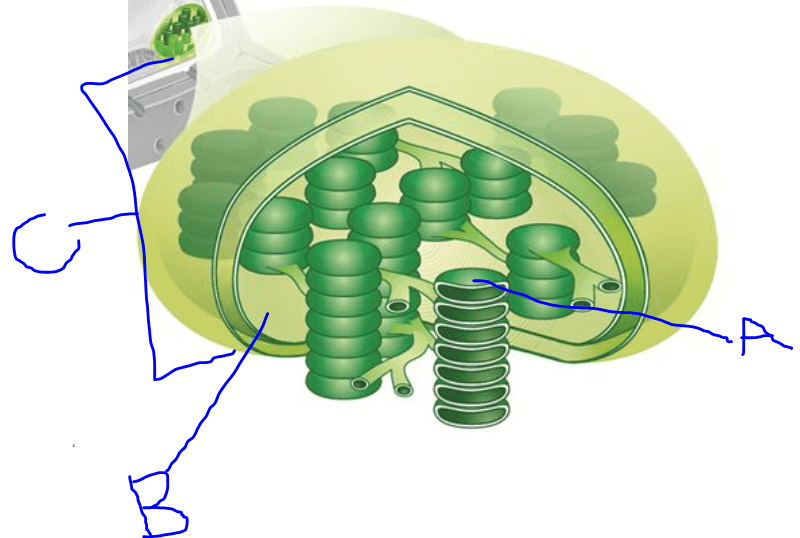True or false: There is a release of energy when ADP converts to ATP.
False- there is an input of energy!
What is the role of chlorophyll in photosynthesis?
It is a pigment that collects sunlight that is used as energy to build sugars/glucose.
TRUE or FALSE: BOTH plants and animals can perform cellular respiration.
TRUE!
Green plants and algae are autotrophs because...
They make their own food through photosynthesis!
What is the term for "not needing oxygen?" What is the term for "needing oxygen?"
Aerobic- oxygen
Which process makes more ATP? Glycolysis/Fermentation or cellular respiration?
***BONUS 200 pts: How much ATP does Glycolysis/Fermentation make? How much ATP does cellular respiration make?
Cellular respiration!
BONUS: Glycolysis/Fermentation- 2; Cellular respiration- 36-38
Label A, B, and C with the proper terms.
A- Thylakoid
B- Stroma
C- Chloroplast
What are the two types of fermentation?
***BONUS 200 pts: Give an example of the organisms that do each type of fermentation.
Lactic acid fermentation- humans/most organisms
Alcoholic fermentation- yeasts/other microbes
When we eat fruits and vegetables, we are able to gain energy because they provide_________.
Sugar/glucose/C6H12O6
***BONUS: How many times does the Krebs Cycle spin?
1) Pyruvic acid
BONUS: 2
When plants make glucose, it stores/releases energy.
When we use glucose, we break down/store energy.
stores, breaks down
-Reactant: water
-Product: Oxygen
-thylakoid
1) Where does fermentation take place?
2) What other anaerobic process happens here?
2) Glycolysis
What 2 products of photosynthesis are used as reactants for cellular respiration?
List the locations of the following processes:
1) Glycolysis
2) Krebs cycle
3) Electron transport chain
1) Cytoplasm
2) Mitochondria matrix
3) Mitochondria membrane
What is the difference between ADP and ATP?
1 phosphate group
What pigment is located on the photsystems? What 3 things are released when water is split?
-chlorophyll
-oxygen, H+ (hydrogen ions), electrons
1) What is another name for the Krebs Cycle?
2) What is another name for light-independent reactions?
BONUS 100 pts: What does the word glycolysis mean?
1) the citric acid cycle
2) the Calvin Cycle
BONUS: splitting glucose
What 2 products of cellular respiration are reactants of photosynthesis?
Think about the 2 electron carriers for cellular respiration.
1) What are the electron carriers before they pick up electrons?
2) What are the electron carriers after they pick up electrons?
1) NAD+, FAD
2) NADH, FADH2
1) Which process(es) in cellular respiration makes the most amount of ATP? How many are made here?
2) Which process(es) of cellular respiration makes the least amount of ATP? How many are made here?
1) ETC- 32 ATP
2) Krebs Cycle- 2 ATP
What is the equation of photosynthesis? (this can be in letters and numbers OR words OR both)
When certain plants need to conserve water, they will close the pores on their leaves. By closing their pores, they minimize water loss through the pores. This also means carbon dioxide will not be able to enter leaves.
1) Will this increase or decrease the rate of photosynthesis?
2) Name a biome that might have plants like this.
1) Decrease
2) the desert
1). What are the 4 steps of the light-dependent reactions? 2.) What is the 1 step of the light-independent reactions?
- photosystem II, ETC, photosystem I, ATP Synthase
-Calvin Cycle
Glucose is broken down in several small steps (think of glycolysis, Krebs cycle, ETC)